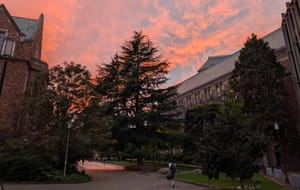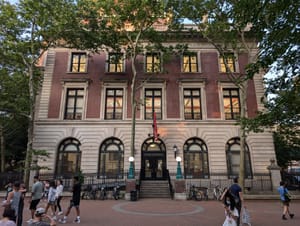The entrepreneur
I participated in an interesting event at the School of Information and Library Science at UNC a while ago. It was a symposium to consider the ‘information professional’ of 2050. Yes, that is 2050 🙂 There was a mix of people. Some in LIS education; some in libraries; and some in industry.
One word that was used a lot was ‘entrepreneur’. It was used in two related ways. First was entrepreneur with a big ‘E’, where schools are preparing people with the skills and outlook to found or go into startups. Second was entrepreneur with a little ‘e’, where schools are preparing people to work flexibly in dynamic environments which value enterprise.
I was interested in this theme as it chimed with a quote from Manuel Castells I had used in my written submission to the Symposium (these will be published later in the year). My focus was on libraries, not on the broader information field. Here is the Castells quote …
In a dynamic, evolutionary perspective there is a fundamental difference between two types of organizations: organizations for which the reproduction of their system of means becomes their main organizational goal; and organizations in which goals, and the change of goals, shape and endlessly reshape the structure of means. I call the first type of organizations bureaucracies; the second type, enterprises. // Castells, Manuel. The Rise of the Network Society. Malden, MA: Wiley-Blackwell, 2010. Print.
This is quite dense, and needs to be unpicked a little in relation to libraries. Historically, libraries enjoyed stability and a shared understanding of goals. This in turn favored a focus on managing and improving the means towards those goals – building the collection, providing reference service, creating efficiencies in technical processing, and so on. This was the focus of professional practice and education. Much of this work is inherently bureaucratic. However, in an environment of change while overall mission and values may remain the same, new and shifting goals become the norm. Think of greater integration in the learning and research process through greater curriculum support, data curation, scholarly publishing, or support for grant writing or expertise profiles. Think of network based reading services, or jobseeking and homework support. As goals shift in a changing environment, so does the need to think about how to marshall the means to meet them. This may need reorganization, new staff skills, changing priorities, reallocation of staff and resources, and so on. It requires a shift from bureaucracy to enterprise, an adaptive organization that reviews and reshapes what it does in light of changing requirements.
The enterprising librarian
Now, just after I had written my submission I came across an interesting looking book by Bethan Ruddock: The new professional’s toolkit. I was very taken with the table of contents and the OCLC Library kindly acquired a copy for me. Here is the table of contents:
- 1. Project management
- 2. Teaching, training & communicating
- 3. Meeting your users needs and measuring success
- 4. Marketing your service and engaging stakeholders
- 5. Using technologies
- 6. Getting and staying online
- 7. Generating funding and doing more with less
- 8. Managing money – budgets & negotiating
- 9. Information ethics and copyright
- 10. Up-skilling and professional development
- 11. Networking and promoting yourself
- 12. Professional involvement & career development
Each chapter includes practioner case studies, some from her colleagues at Manchester. Readers will find some familiar names there, including for example Amanda Hill, Bohyun Kim, Lukas Koster, Jenica Rogers. An expanded table of contents with links to some of the case studies is on the book blog. I paste in the fuller list at the end of this entry for reference. Now, Bethan talks about information professionals broadly in the preface but this looks like a publisher-encouraged widening of focus (I may be wrong :-). In the Introduction, she notes it is aimed at librarians and archivists.
What struck me immediately about this list was how the focus was very much on generic skills applied in a library or archival context. And those skills are very much about managing an enterprise: many are explicitly about managing in a changing environment. Importantly, much of the material is about positioning oneself or one’s organization in relation to other players, a theme that becomes more important in dynamic environments of multiple stakeholders. So, for example, there is material about budgets; but there is also material about negotiating, about raising money from other sources, about demonstrating value. There is little material here about management as such, which surely would have featured in an equivalent volume some years ago, but there is material on managing projects, on training and communication, and on assessing needs and evaluating services. There is also a strong emphasis on personal skills and positioning, with discussions of personal branding in a networked environment, skills development, and professional involvement. It is taken for granted that communication, marketing, assessment, promotion and brand management are central activities for the organization and the individual. For example …
It is not just your organization and services that need promoting: you also need to promote yourself and for many of the same reasons. This isn’t about boasting about how great you are, but about making people aware of of your unique skills and expertise, so they can call on them as necessary.
Just as your users won’t know how your service can help them unless you specifically tell them, people won’t know what you personally have to offer unless you make it obvious. In the workplace, you as a peson can inspire trust and reliance in a way that your library or archive as a service can never do. Your users are much more likely to connect with your pesonal expertise: ‘The information service can do that. I read it on a leaflet’ is a much less powerful message than: ‘Bethan can do that. She was talking to me about it last week.’ Your knowledge, expertise and personal skills can be a very valuable asset to your organization.
This echoed a comment I have been using in presentations recently: “if the library wishes to be seen as expert, its expertise must be visible”.
The book does focus on the individual rather than the organization, so the technology chapters, for example, are somewhat impressionistic, but they do hand off to interesting and informative case studies. And one can look elsewhere for the detail.
This ‘toolkit’ covers some of what I took to be entrepreneurial skills. Or in language I prefer in this context, it covers some of the skills the library enterprise needs to include, and the enterprising librarian needs to have.
Here is the expanded list of contents.
1. Project management
- What is a project?
- Finding project work
- Case study: Librarian to Project Manager (Annette Earl)
- Methodologies and tools
- Case study: the Blyton project (Hannah Green)
2. Teaching, training & communicating
- Effective communication
- Teaching and training
- Case study: how to run training sessions (Lisa Jeskins | full version)
- Further qualifications (includes vignettes from Lynne Meehan | full version and Edith Speller | full version )
- Case study: ALT games and learning (Rosie Jones)
- Case study: Rhymetime for everyone (Linsey Chrisman)
- Presenting to professional peers
- Case study: how to make your first presentation a winning one (Bronagh McCrudden)
- Case study: how to write for publication (Jo Alcock)
3. Meeting your users needs and measuring success
- Case study: the SLA Alignment Project (Amy Affelt)
- Case study: evaluating the impact of your library (David Streatfield)
- Encouraging user participation
- Evidence-gathering tools
4. Marketing your service and engaging stakeholders
- What is marketing?
- Plan your marketing
- Case study: identifying and working with stakeholders (Michael Stead)
- Case study: creating customer-friendly e-reader experiences (Alison Circle)
- Case study: embedded librarianship (Reece Dano)
5. Utilising technologies
- The move towards automation
- Case study: how to become a zen master of technology (Bohyun Kim)
- Case study: I, Shambrarian (Lukas Koster | full version)
- Technology for the non-technical
- Case study: introduction to sustainable digital preservation (Beccy Shipman)
- Repositories
6. Getting and staying online
- Case study: interoperability and sustainability (Jane Stevenson)
- Case study: social media in the big city (Sue Lawson)
- Case study: Deseronto Archives (Amanda Hill)
- Social media tools
7. Generating funding and doing more with less
- Demonstrating value
- Finding more funding
- Case study: how to identify funding sources (Caroline Williams)
- Case study: the Big Lottery Award: Luton’s experience (Fiona Marriott)
- Case study: Veria Public Library (Ioannis Trohopoulos, Dimitris Protopsaltou, and Dick Hartley)
8. Managing money – budgets & negotiating
- Budgets
- Case study: how to manage your budget (Laura Wilkinson)
- Negotiating
- Case study: consortia and negoatiating (Michael Stead)
9. Information ethics and copyright
- Case study: an introduction to information ethics (David McMenemy)
- Case study: how to start out in copyright (Emily Goodhand)
- Case study: copyright in archives (Tim Padfield)
10. Up-skilling and professional development
- Case study: how to assess yourself (Deborah Dalley | full version)
- Bodies of professional knowledge
- Case study: SLA’s Competencies for Information Professionals of the 21st Century (Dee Magnoni)
- Case study: CPD on a shoestring (Laura Woods)
- Case study: how to get the most out of training and development (Gil Young)
- Case study: long-distance mentoring (Emily Hopkins)
- Case study: how to be a mentor (Jenica Rogers)
11. Networking and promoting yourself
- Case study: personal branding (Kathy Ennis)
- Case study: how to build your information professional brand (Ned Potter)
- Networking
- Case study: professional networking (Maria Cotera)
- Case study: solo librarian, Cafcass (Jo Wood)
- Case study: solo records manager, TWI (Lee Pretlove)
12. Professional involvement & career development
- Conferences
- Case study: how to write a successful conference proposal (Chris Rhodes)
- Case study: how to work an exhibition stand (Lisa Charnock)
- Case study: how to apply for awards (Laura Woods)
- Unconferences
- Case study: professional involvement for personal development (Lauren Smith)
- Case study: joining a professional organisation (Fiona Bradley)
- Other professional involvement (includes vignettes from Sarah Wachter | full version and Rebecca Goldman)
- Case study: tips for career planning success (Sarah Johnson)
- Top tips for CV and interview success (Suzanne Wheatley | full version)
- How did we get here? (includes vignettes from Maria Robertson | full version, Linda Butt | full version, and Aileen Marshall | full version)



